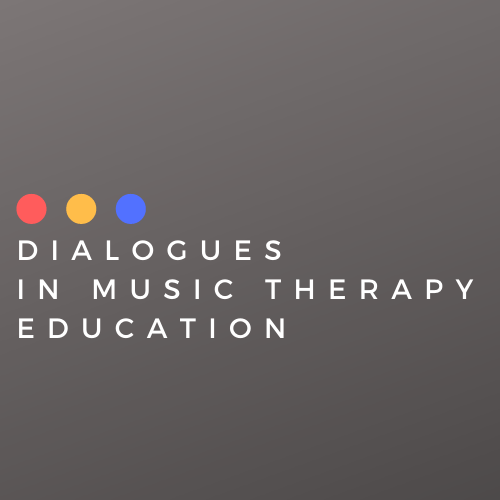The Outcomes and Experiences of Students in Course-based Undergraduate Research Experience (CURE)
DOI:
https://doi.org/10.18060/27164Keywords:
course-based undergraduate research experience, student experiences, student outcomes, Music Therapy EducationAbstract
Research is a pivotal element of music therapy education. Finding, interpreting, and integrating research into clinical practice are required in the professional competencies (American Music Therapy Association, 2013, 2021). Course-based undergraduate research experiences (CURE) have been identified by the National Science Foundation to increase access to underrepresented student populations in STEM programs. Fewer studies have been seen in humanities. To develop competency in a cohort of music therapy students, a CURE was developed with student research collaborating on all parts of the study. Elements of the CURE were guided by Dvorak and Hernandez-Ruiz (2019); one of the first publications in music therapy using this approach with students. However, in the present CURE each student developed their own research question within a larger project, modeled after a lab-based approach. Students who wished to present their research as a poster for the regional or national conference were prepared to do so. Significant improvements in were found (p<.0001) three categories on the Research Skill Development Questionnaire (RSDQ: Dvorak et al., 2021) including knowledge of research-related content, research skills, and research dispositions. Student reflections share a growth in comfort with and accessibility of conducting research as something “not just for scientists and doctors” but that was “a lot less stressful, and really fun!” Others reported a motivation to identify questions and conduct research in the future. The outcome was a fully immersive educational experience and functional a resource for members within the School of Music to educate on hearing loss prevention.
References
American Music Therapy Association. (2010). Strategic priority on research. https://www.musictherapy.org/research/strategic_priority_on_research/
American Music Therapy Association. (2013). Professional Competencies. https://www.musictherapy.org/about/competencies/
American Music Therapy Association. (2015). Music therapy research 2025: Proceedings. American Music Therapy Association. https://www.musictherapy.org/assets/1/7/MTR2025proceedings.pdf
American Music Therapy Association. (2021). Standards for Education and Clinical Training. American Music Therapy Association. https://www.musictherapy.org/members/edctstan/
American Music Therapy Association. (2022). E. Thayer Gaston Research Competition. https://www.musictherapy.org/careers/scholars/#E._Thayer_Gaston_Writing_Competition
Auchincloss, L. C., Laursen, S. L., Branchaw, J., Eagan, K., Graham, M. J., Hanauer, D. I., Lawrie, G. A., McLinn, C. M., Pelaez, N., Rowland, S., Towns, M. H., Trautmann, N. M., Varma-Nelson, P., Weston, T. J., & Dolan, E. L. (2014). Assessment of Course-Based Undergraduate Research Experiences: A Meeting Report. CBE- Life Sciences Education, 13(1), 29–40. https://doi.org/10.1187/cbe.14-01-0004
Bangera, G., & Brownell, S. E. (2014). Course-based undergraduate research experiences can make scientific research more inclusive. CBE- Life Sciences Education, 13(4), 602–606. https://doi.org/10.1187/cbe.14-06-0099
Brownell, S. E., & Kloser, M. J. (2015). Toward a conceptual framework for measuring the effectiveness of course-based undergraduate research experiences in undergraduate biology. Studies in Higher Education, 40(3), 525–544. https://doi.org/10.1080/03075079.2015.1004234
Dolan, E. L. (2016). Course-based undergraduate research experiences: Current knowledge and future directions (pp. 1–34). National Research Council Washington, DC.
Dvorak, A., Hernandez-Ruiz, E., & Weingarten, K. M. (2021). Course-Based Undergraduate Research Experience: Music Education and Music Therapy Student Outcomes. Journal of Music Teacher Education, 30(3), 26–39. https://doi.org/10.1177/10570837211002167
Dvorak, A. L., & Hernandez-Ruiz, E. (2019). Outcomes of a course-based undergraduate research experience (CURE) for music therapy and music education students. Journal of Music Therapy, 56(1), 30–60.
Dvorak, A. L., Hernandez-Ruiz, E., Nick, H., Qi, R., Alderete, C., Frieze, Z., Georgeson, K., Gilliam, T. M., Hatcliff, A., & Kirsch, A. (2020). Student music stimuli composition in a scaffolded course-based undergraduate research experience. Dialogues in Music Therapy Education, 1(1), 1–32.
Hernandez-Ruiz, E., & Dvorak, A. L. (2020). Replication of a course-based undergraduate research experience for music students. Nordic Journal of Music Therapy, 29(4), 317–333.
Hunter, A.-B., Laursen, S. L., & Seymour, E. (2007). Becoming a scientist: The role of undergraduate research in students’ cognitive, personal, and professional development. Science Education, 91(1), 36–74. https://doi.org/10.1002/sce.20173
Russell, J., D’Costa, A., Runck, C., Barnes, D. W., Barrera, A. L., Hurst-Kennedy, J., Sudduth, E. B., Quinlan, E. L., Schlueter, M. A., Iskhakova, L. A., & Haining, R. L. (2015). Bridging the Undergraduate Curriculum Using an Integrated Course-Embedded Undergraduate Research Experience (ICURE). CBE- Life Sciences Education, 14(1). https://doi.org/10.1187/cbe.14-09-0151
Russell, S. H., Hancock, M. P., & McCullough, J. (2007). Benefits of Undergraduate Research Experiences. Science, 316(5824), 548–549. https://doi.org/10.1126/science.1140384
Shortlidge, E. E., Bangera, G., & Brownell, S. E. (2017). Each to their own CURE: faculty who teach course-based undergraduate research experiences report why you too should teach a CURE. Journal of Microbiology & Biology Education, 18(2), 18.2. 10.
Weston, T. J., & Laursen, S. L. (2015). The undergraduate research student self-assessment (URSSA): Validation for use in program evaluation. CBE—Life Sciences Education, 14(3), ar33.
Downloads
Published
How to Cite
Issue
Section
License
Copyright (c) 2024 Virginia Driscoll, Zachary Palma, Katja Beebe

This work is licensed under a Creative Commons Attribution 4.0 International License.





